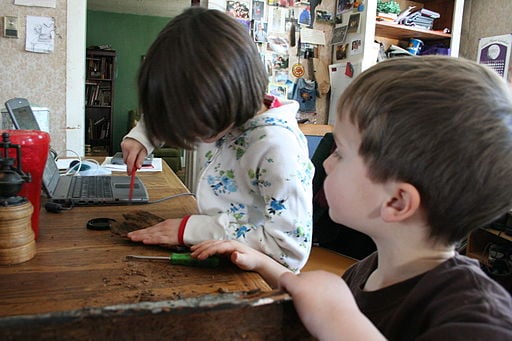“Some people worship money. Some people worship many gods. We mainly worship just one god.” Thus pronounced Ezra, as he was assessing our family’s spiritual devotion.
Apparently he had been chewing on last week’s Sunday School lesson about the ten commandments, and had decided that while we “mainly worshipped just one God,” sometimes we fall a little short. During the lesson, I spent a lot of time contrasting the beliefs of the wandering Israelites with the beliefs of the polytheistic cultures around them. I also spent a lot of time talking about how hard it was for the Israelites to hang on to those beliefs when they were tired, hungry, thirsty, and sick of all that sand. At times like that, I reminded the five- to ten-year-olds in my class, it’s hard not to fashion yourself a little idol, a golden calf to stave off uncertainty and fear.
Many of you have read our struggles over the last year with one of our son’s diagnoses. He now has so many letters on his chart, it’s hard to keep them all straight. Some days, I can’t imagine that God ever made a creature as lovely as my son. Other days, I am filled with dread as I try to imagine his future. On days like that, it’s hard to resist the urge to melt my earrings and hire another expert to make things better.
This week, we received the results of genetic testing that we did after one of our son’s many doctors noticed some “dysmorphic” features. We waited for three months for the appointment and another three months for the results. During that entire time, I kept wondering what it would mean if they told us that he had a genetic syndrome of one type or another. Who and what did I trust for the well being of my child?
It turns out that they didn’t identify a specific genetic disorder. And yet, the doctor said, he does have all of these symptoms of someone whose genetic makeup is not typical. So there is a chance that down the road, as more and more syndromes are identified, we’ll have a name for the particular genetic cocktail that is our son. They recommended that we check back in every year for another screening. Just as they are identifying more and more syndromes each year, they are more and more hopeful of curing those syndromes.
Now I know that there are a lot of people out there who think that we shouldn’t “treat” syndromic children. They are different and special and unique, so why would you want to treat them? But I’m not so sure. What about cancer? Or cleft lips? If we could give kids a pill to cure their dyslexia, would we not do that? How do we decide?
The problem is that when you idolize intelligence, and creativity, and competence, and self-sufficiency, when you worship cleverness, and social savvy, and ordered thinking, behavior, and filing systems, well, then it’s hard to know when you are intervening to help your child “reach his full potential,” and when you are intervening because you refuse to love the child you have and worship the God who gave you that child.
When the latest research reveals that brains are far more plastic than anyone had suspected, meaning that they can grow and that new neural connections can be established, should we not work as hard as possible to help children lay new pathways that don’t include intense anxiety when plans change? What about new pathways to help them read social cues? Or understand higher order thinking questions? Where do you stop?
The questions for Jeff and me are about how to help our son without rejecting the gift God has given us in the exact form of this one child. Our son was not a mistake. God has a purpose for him, and he will no doubt use this child’s unique mix of strengths and weaknesses for a unique purpose.
But I’m not ready to say that all of his struggles, even those that are genetically determined, are determined for life. And I don’t think this means that I have made an idol of being typical. But maybe I’m wrong.
I’m not ready to say that it’s okay with me if he struggles socially his entire life. And I don’t think it means I have made an idol out of social competence. But maybe I’m deluding myself.
My prayers these days have been for my son to have a great relationship with God, to be a great husband and father, and to enjoy meaningful work. I don’t think these are idols. Maybe, though, I’ve made an idol of myself, thinking I know best what to pray for.
The trick, I suppose, is in letting God figure out if and how to make all of those dreams a reality, letting God direct our efforts, and laying down my reliance on experts and interventions.
Ezra’s assessment that we “mainly worship just one God” might currently be overly optimistic. But the story is not over.
As we got in the car today to head out for the long weekend, Zach prayed, “Lord, help us get all the way there safely.”
Amen.











